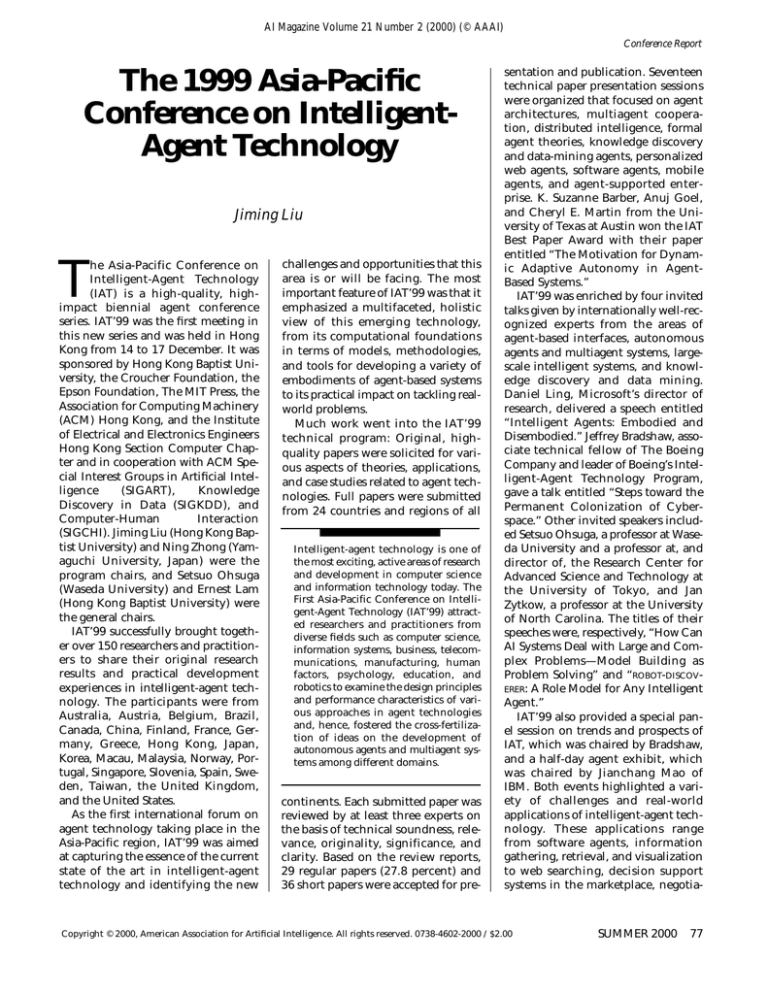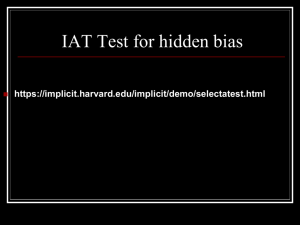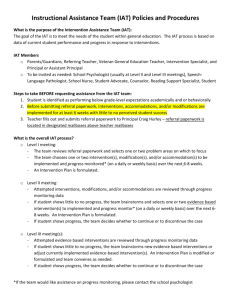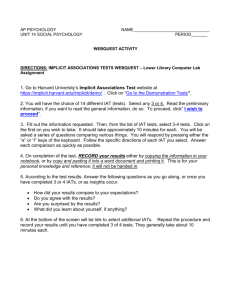
AI Magazine Volume 21 Number 2 (2000) (© AAAI)
Conference Report
The 1999 Asia-Pacific
Conference on IntelligentAgent Technology
Jiming Liu
T
he Asia-Pacific Conference on
Intelligent-Agent Technology
(IAT) is a high-quality, highimpact biennial agent conference
series. IAT’99 was the first meeting in
this new series and was held in Hong
Kong from 14 to 17 December. It was
sponsored by Hong Kong Baptist University, the Croucher Foundation, the
Epson Foundation, The MIT Press, the
Association for Computing Machinery
(ACM) Hong Kong, and the Institute
of Electrical and Electronics Engineers
Hong Kong Section Computer Chapter and in cooperation with ACM Special Interest Groups in Artificial Intelligence
(SIGART),
Knowledge
Discovery in Data (SIGKDD), and
Computer-Human
Interaction
(SIGCHI). Jiming Liu (Hong Kong Baptist University) and Ning Zhong (Yamaguchi University, Japan) were the
program chairs, and Setsuo Ohsuga
(Waseda University) and Ernest Lam
(Hong Kong Baptist University) were
the general chairs.
IAT’99 successfully brought together over 150 researchers and practitioners to share their original research
results and practical development
experiences in intelligent-agent technology. The participants were from
Australia, Austria, Belgium, Brazil,
Canada, China, Finland, France, Germany, Greece, Hong Kong, Japan,
Korea, Macau, Malaysia, Norway, Portugal, Singapore, Slovenia, Spain, Sweden, Taiwan, the United Kingdom,
and the United States.
As the first international forum on
agent technology taking place in the
Asia-Pacific region, IAT’99 was aimed
at capturing the essence of the current
state of the art in intelligent-agent
technology and identifying the new
challenges and opportunities that this
area is or will be facing. The most
important feature of IAT’99 was that it
emphasized a multifaceted, holistic
view of this emerging technology,
from its computational foundations
in terms of models, methodologies,
and tools for developing a variety of
embodiments of agent-based systems
to its practical impact on tackling realworld problems.
Much work went into the IAT’99
technical program: Original, highquality papers were solicited for various aspects of theories, applications,
and case studies related to agent technologies. Full papers were submitted
from 24 countries and regions of all
Intelligent-agent technology is one of
the most exciting, active areas of research
and development in computer science
and information technology today. The
First Asia-Pacific Conference on Intelligent-Agent Technology (IAT’99) attracted researchers and practitioners from
diverse fields such as computer science,
information systems, business, telecommunications, manufacturing, human
factors, psychology, education, and
robotics to examine the design principles
and performance characteristics of various approaches in agent technologies
and, hence, fostered the cross-fertilization of ideas on the development of
autonomous agents and multiagent systems among different domains.
continents. Each submitted paper was
reviewed by at least three experts on
the basis of technical soundness, relevance, originality, significance, and
clarity. Based on the review reports,
29 regular papers (27.8 percent) and
36 short papers were accepted for pre-
sentation and publication. Seventeen
technical paper presentation sessions
were organized that focused on agent
architectures, multiagent cooperation, distributed intelligence, formal
agent theories, knowledge discovery
and data-mining agents, personalized
web agents, software agents, mobile
agents, and agent-supported enterprise. K. Suzanne Barber, Anuj Goel,
and Cheryl E. Martin from the University of Texas at Austin won the IAT
Best Paper Award with their paper
entitled “The Motivation for Dynamic Adaptive Autonomy in AgentBased Systems.”
IAT’99 was enriched by four invited
talks given by internationally well-recognized experts from the areas of
agent-based interfaces, autonomous
agents and multiagent systems, largescale intelligent systems, and knowledge discovery and data mining.
Daniel Ling, Microsoft’s director of
research, delivered a speech entitled
“Intelligent Agents: Embodied and
Disembodied.” Jeffrey Bradshaw, associate technical fellow of The Boeing
Company and leader of Boeing’s Intelligent-Agent Technology Program,
gave a talk entitled “Steps toward the
Permanent Colonization of Cyberspace.” Other invited speakers included Setsuo Ohsuga, a professor at Waseda University and a professor at, and
director of, the Research Center for
Advanced Science and Technology at
the University of Tokyo, and Jan
Zytkow, a professor at the University
of North Carolina. The titles of their
speeches were, respectively, “How Can
AI Systems Deal with Large and Complex Problems—Model Building as
Problem Solving” and “ROBOT-DISCOVERER: A Role Model for Any Intelligent
Agent.”
IAT’99 also provided a special panel session on trends and prospects of
IAT, which was chaired by Bradshaw,
and a half-day agent exhibit, which
was chaired by Jianchang Mao of
IBM. Both events highlighted a variety of challenges and real-world
applications of intelligent-agent technology. These applications range
from software agents, information
gathering, retrieval, and visualization
to web searching, decision support
systems in the marketplace, negotia-
Copyright © 2000, American Association for Artificial Intelligence. All rights reserved. 0738-4602-2000 / $2.00
SUMMER 2000
77
Conference Report
Thirteenth International FLAIRS Conference Proceedings
FLAIRS was founded in 1987 to promote and advance artificial intelligence research within the state of Florida,
fostering interaction between researchers at colleges, universities, and industry. Since 1990, FLAIRS conferences have been broadened to include participants and papers from across North America and the world.
This year’s proceedings covers a wide range of algorithms, methodologies, and applications. The proceedings
features a myriad of topics including AI applications, instructional software, classification, data mining, genetic
algorithms, information retrieval, intelligent agents, knowledge management, knowledge representation, machine
learning, natural language processing, neural networks, spacecraft autonomy, spatiotemporal reasoning, uncertain reasoning, and verification, validation, and system certification.
400 pp., ISBN 0-1-57735-113-4 $50.00
Available from the AAAI Press ■ 445 Burgess Drive ■ Menlo Park, California 94025
To order, call 650-328-3123 or send e-mail to orders@aaai.org. Visit our website at www.aaai.org/Press
tion, meeting coordination, e-mail,
telecontrol robots, intrusion detection, and tracing to an n-queen problem solver that is applicable to other
large constraint-satisfaction problems. Ten demonstrations were provided by overseas and local participants from both academia and
industry. These demonstrations provided an excellent snapshot of the
current activities in the field. The
demonstrations also addressed many
design issues related to agent architectures, models, methodology, multiagent cooperation, data and web
mining, distributed intelligence,
mobile agents, and security. Demonstrators shared with visitors their
valuable hands-on experiences in
building real systems. The Information-Technology Promotion Agency,
Japan, won the Best Demo Award
with its “Information Retrieval and
Intrusion-Route Tracing for Intrusion
Detection by Use of Mobile Agents.”
The team members were all present to
give a demonstration of this intrusion-detection–agent system.
In addition to the main conference,
IAT’99 also featured a one-day workshop entitled “Agents in Electronic
Commerce (WAEC),” chaired by Yiming Ye of IBM, on 14 December 1999.
78
AI MAGAZINE
More than 30 oral presentations and
invited talks were given by researchers
and practitioners from around the
world in the field of electronic commerce. The two invited talks were given by Wlodek Zadrozny of IBM and
Anthony Hall of Nortel. C. J. Tan,
director of IBM’s E-Business Technology Institute (leader of IBM’s DEEP BLUE
Chess Project), presented the Best
Workshop Paper Award and delivered
a keynote speech at the opening of the
workshop. The Best Workshop Paper
Award went to Pinar Keskinocak of the
Georgia Institute of Technology and a
team of associates from IBM T. J. Watson Research Center. They presented a
paper on decision support for managing an electronic supply chain.
IAT’99 was a big success in many
ways. Besides its rich and solid technical program, IAT’99 also contained a
number of social events that provided
the participants ample time to
exchange ideas and get to know each
other. The most attractive and wellreceived events were a complimentary,
four-hour bus tour of Hong Kong’s
most famous scenic places and a
breathtaking banquet-dinner cruise at
which the Best IAT Paper and the Best
Demo awards were presented. Also
during this banquet cruise, it was offi-
cially announced that the next IAT
conference will be held in Tokyo,
Japan, in October 2001. For more
information about IAT, go to
www.comp.hkbu.edu.hk/IAT.
Jiming Liu is an associate professor of computer science at Hong
Kong Baptist University and is a senior
member of the Institute of Electrical and
Electronics Engineers.
He is the author of two forthcoming
books, entitled Learning and Adaptation in Multiagent Robotic Systems
(CRC Press, 2000) and Autonomous
Agents and Multiagent Systems: An
Introduction (World Scientific, 2000).
He is also the editor of Intelligent-Agent
Technology: Systems, Methodologies, and
Tools (World Scientific, 1999). His current research interests include
autonomous agents and multiagent
systems, AI, learning, self-adaptation,
applied dynamics of computation and
complex systems, robotics, customized
electronic commerce, and active media
technology. His e-mail address is jiming@comp.hkbu.edu.hk.




